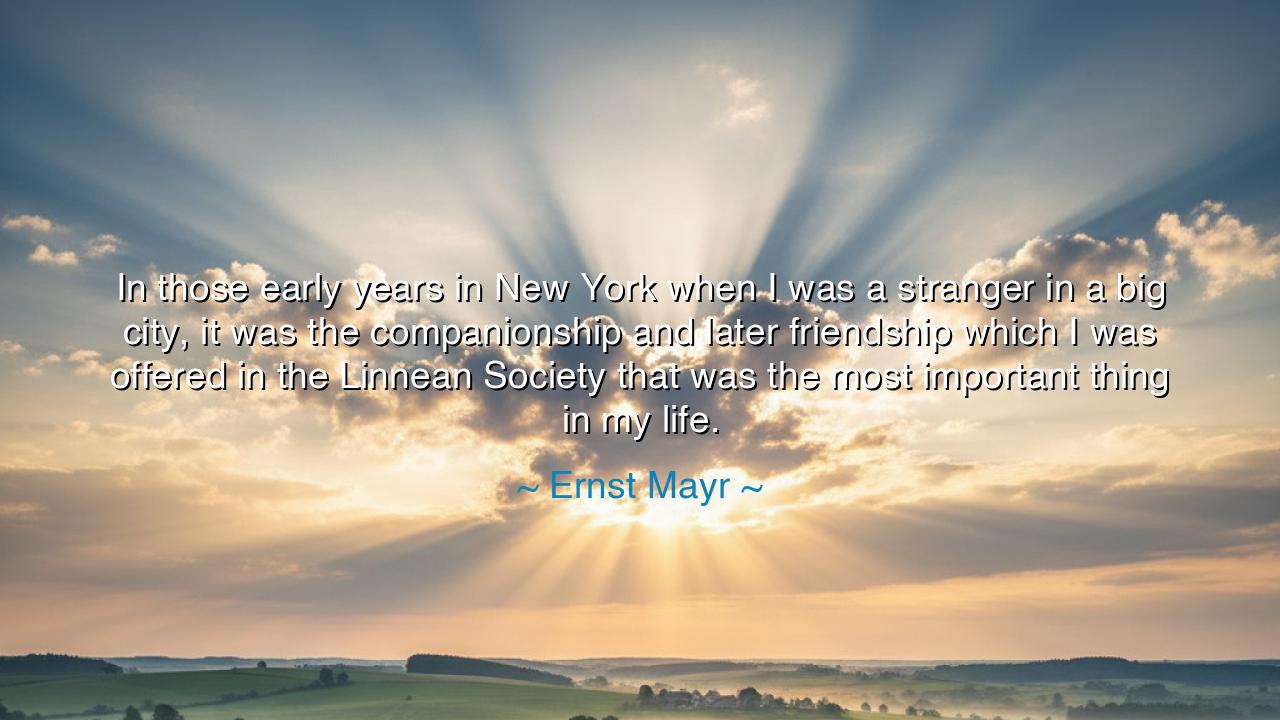
In those early years in New York when I was a stranger in a big
In those early years in New York when I was a stranger in a big city, it was the companionship and later friendship which I was offered in the Linnean Society that was the most important thing in my life.






“In those early years in New York when I was a stranger in a big city, it was the companionship and later friendship which I was offered in the Linnean Society that was the most important thing in my life.” With these gentle and reflective words, Ernst Mayr, one of the greatest evolutionary biologists of the twentieth century, opens a window into the human side of genius — a reminder that even the keenest intellect needs warmth, belonging, and human connection to flourish. Beneath the modest tone of his recollection lies an ancient truth: friendship is the soil in which both knowledge and the soul take root. For even in the halls of science, it is companionship — not isolation — that sustains the spirit of discovery.
The meaning of Mayr’s words goes beyond the personal. It speaks of the loneliness that often accompanies great beginnings — the feeling of being a stranger in a vast world, surrounded by people yet unseen, known to none. When he arrived in New York as a young immigrant from Germany in the early 1930s, Mayr found himself in a city teeming with opportunity but devoid of familiarity. He possessed brilliance, yes, but not belonging. The Linnean Society, a fellowship of naturalists devoted to the study of life’s diversity, became his refuge. There, among like-minded seekers, he found what the heart longs for even more than success — companionship that evolves into friendship, and through it, a sense of purpose.
The origin of this sentiment is as old as humanity itself. Every age has known the exile — the wanderer who travels far from home in pursuit of knowledge or destiny, only to find that the greatest discoveries come not from solitude, but from connection. In Mayr’s case, the Linnean Society offered not merely professional support, but a sanctuary of understanding. It was there that ideas were exchanged freely, that debates sharpened the mind, and that friendships soothed the loneliness of a foreign land. What he calls “the most important thing” was not the science alone, but the community of kindred spirits who embraced him when the world felt cold and vast.
History has seen this pattern repeated in many forms. Consider the story of Marie Curie, who, like Mayr, left her homeland in search of knowledge. In Paris, she too was a stranger — poor, foreign, and overlooked. Yet she found strength through her partnership and friendship with Pierre Curie, a bond that transcended isolation and led to some of the greatest scientific discoveries of their age. Their connection was not merely romantic; it was the meeting of two minds who saw in one another the same devotion to truth. Both Curie and Mayr teach us that human companionship — whether in friendship, mentorship, or shared passion — can ignite the flame that solitude cannot.
Mayr’s reflection also reminds us of the moral value of welcome — that those who open their hearts to the stranger often change the course of history. The members of the Linnean Society may not have known then that they were embracing one of the future architects of evolutionary theory, but their kindness helped shape his journey. By offering friendship instead of formality, they gave him the foundation upon which to build his life’s work. This truth transcends science: to recognize another’s humanity before their achievements is the highest form of wisdom.
The lesson that flows from Mayr’s words is simple yet profound: never underestimate the power of companionship. In the cold expanse of ambition and achievement, it is friendship that gives life warmth and meaning. Whether you are a scholar, an artist, or a traveler, seek not only the pursuit of greatness but the company of those who inspire and sustain you. Be that companion for others as well — offer welcome to those who are new, understanding to those who are lost, and kindness to those who struggle in silence. The friendships you build will not only change their lives; they will strengthen your own.
In practical life, this means nurturing communities of purpose wherever you go. Join, create, or contribute to circles where minds can meet and hearts can rest. Reach out to those who stand alone. Encourage collaboration over competition. And remember that in every great achievement — from the discoveries of science to the revolutions of art — there lies an unseen network of friends, mentors, and kindred souls who made that greatness possible.
For in the end, as Ernst Mayr so gracefully reminds us, the heart of every journey is not the destination, but the companionship found along the way. Knowledge without friendship becomes cold and brittle, but when warmed by fellowship, it blossoms into wisdom. So let us walk through the vastness of life not as solitary seekers, but as companions in the grand adventure of being human — for it is friendship, more than fortune or fame, that makes every strange land feel like home.






AAdministratorAdministrator
Welcome, honored guests. Please leave a comment, we will respond soon